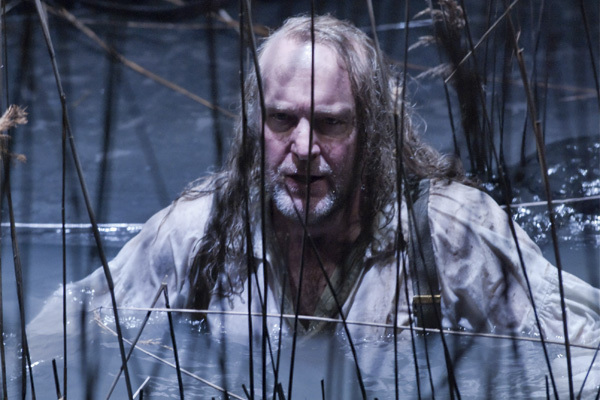Weber’s Der Freischütz is the finest neglected opera in or hovering on the edge of the canon. It’s not entirely bewildering why it should be, but there are ways of coping with structural defects, which is what it suffers from. Yet I don’t think there has been a UK performance of it since Edinburgh in 2002 (not counting the Berlioz version last year at the Proms), when Jonas Kaufmann sang Max in a concert performance. Perhaps concert performances are the best idea, since the one last week at the Barbican, under Sir Colin Davis, was thrilling and moving. Yet even it wasn’t entirely convincing on the structural problem, which is that almost all the significant action, and there is a fair amount, occurs in the spoken dialogue, of which there are enormous quantities.
The solution opted for at the Barbican was to have Malcolm Sinclair, actor and frequent participant in musical events, read a narration written by Amanda Holden. Quite a dramatic narration, with Sinclair semi-impersonating some of the characters, but the shift from that to the music was sometimes awkward. Still, the performance was a great success, and, as ever, I left wondering whether at last we might have a chance to see it more often.
Even German friends of mine say that Freischütz is ‘too German’ — as if anything could be. I think what they mean is that it has a certain kind of Romantic naiveté that one only comes across in German works. When he conducted it in Salzburg in 1954, Furtwängler wrote, ‘In this work, the world is still full of mystery. We must forget that we are living in an age of world-embracing technology that no longer brooks any secrets.’ And the way Weber engenders this return to mystery is by enthusiastically engaging the whole atmosphere of Gothick, which reaches its apogee in the Wolf’s Glen scene, which is still amazing, even if not frightening.
No wonder Berlioz was such an admirer of the opera; some of his most striking orchestral effects are inconceivable without it. Coming at the end of Act II, that scene does leave one wondering whether a further act is required — but then the music of Act III is so glorious that one couldn’t do without it. It has a heavily Christian message, one voiced by the Hermit to quite marvellous music, with a solo flute singing a melody that it’s impossible to get out of your head for days; and then the whole ensemble, agreeing that one shouldn’t judge sinners (somehow this message never seems to get across to believers), joins in a rocking ensemble of sublime simplicity.
Davis has long been a champion of Freischütz, and this was as exciting a performance as it is likely to get, apart from the overture, superbly articulated by the London Symphony Orchestra on top form, but not maintaining the tension it needs. Davis was a considerate accompanist, with an impressive line-up. It was a relief to hear Simon O’Neill in such fine form, and the two women were ideal: Christine Brewer kept her enormous voice mainly under control, and her two arias were spellbinding, but almost trumped by Sally Matthews’s Ännchen, whose delicious music she realised more than anyone I have ever heard. The other male singers were all one could hope, with the always-welcome but rarely heard Gidon Saks as a hermit of ultimate gravitas. The chorus obviously adored making the variety of spooky sounds they were called on for. There will be a recording of this exciting event.
At the Hampstead Theatre, an appealing and comfortable venue, ENO’s Contemporary Opera Group is mounting a production of Wolfgang Rihm’s Jakob Lenz. It features a truly incredible performance by Andrew Shore in the title role. Identification could go no further. He even throws himself into muddy water at least four times, undergoing complete immersion, nonchalantly drying some of himself, and resuming his arduous vocal line.
It is an indictment of the work that, despite Shore’s heroism, and the adequate or more performances by everyone involved, Jakob Lenz remains unmoving. It is written in that often noisy expressionist mode much cultivated in the 1970s in Europe, and a priori just the thing for the depiction of a madman going madder. But for all the hallucinatory visual effects, and the manifest desperation of Lenz as, visiting his friend Oberlin, he fights but regularly succumbs to his schizoid condition, we remain on the outside.
Sam Brown’s production, with women and small girls constantly arriving from the auditorium and disappearing again, has too much going on, too little of it intelligible. So far as I could judge, Alex Ingram, the conductor, made as much as possible of the score. Let’s hope the next efforts of the COG will be devoted to a worthier cause.






Comments